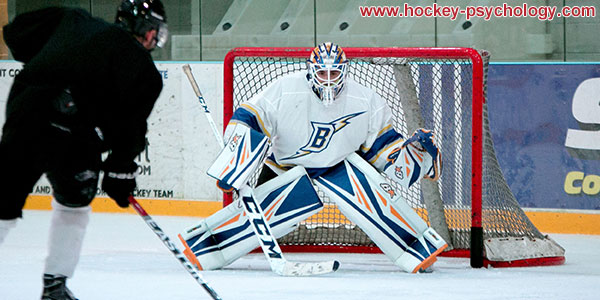How to Boost Confidence in Hockey
How do you build high, unwavering self-confidence?
This is one of most common question asked by hockey players…
When you think about your best games, you’ll notice confidence was high. It’s easy to have high confidence when you’re playing well.
Conversely, when you review games you did not do well, you’ll probably note a lack of confidence.
Many hockey players experience confidence as if they were on a roller coaster… when they have a good game, their confidence is high… when they have a bad game, their confidence plummets.
I call this fragile confidence. Your confidence depends on how you played or the results of the last game.
As you can see, this type of confidence is unstable and problematic.
You will have some bad games… It’s a guarantee.
Fragile confidence is the number one reason for inconsistent play.
The opposite of this roller-coaster confidence is stable confidence.
Stable confidence is when you proactively and consciously use mental strategies to fuel your confidence.
Rather than being at the whim of potential outcomes, stable confidence is taking responsibility for your confidence before every game.
Stable confidence is about understanding what helps you feel confident–and what can hurt your confidence as well.
When all your practice and training is complete, confidence is the most important skill over speed, agility, shooting, passing or fast reflexes.
While those skills are important, it is confidence that allows you to showcase those skills in competition.
Without confidence, a talented hockey player would be slightly better than average.
If you want to be your best, do the one thing that will give you the most bang for your buck… Commit to developing confidence on a daily basis.
Confidence helps a hockey player persistently work towards their goals.
One such example is forward Kevin Lynch, who landed his first NHL contract with the Tampa Bay Lightning at age 27.
Lynch is a sixth-year pro who played on various minor hockey teams prior to signing his NHL one-year contract.
Lynch isn’t an elite goal scorer but focuses on his skill set as a penalty killer, third-line forward, versatile player and face-off specialist.
Lynch is well aware of his strengths and he continues to develop his strengths which, proactively, contribute to his confidence.
LYNCH: “I wanted to keep getting better and better each year to show, eventually, one organization what I was capable of. I was able to get a great opportunity two years ago, then came up here when there were injuries, just tried to make the most of it. That’s what I just try to do every day, just bring the same foundation that I do every single day, what’s gotten me here to this point. Hopefully I can keep going up.”
Strategies to help you build confidence:
- Focus on your strengths.
- Remind yourself of successful previous events.
- Give yourself credit for each and every success through a game.
- Visualize playing great games.
- Recall all the improvements you have made in your game.
- Prepare the best you can for each game.
- Work to improve your strengths even more.
- Engage in positive self-talk instead of thinking negatively during games.
Take responsibility for your confidence… It is your greatest asset as a hockey player.
Confidence will be fragile if you only rely on your past results. Instead, focus on your talents and strengths that help you play at a high level.
Come to every game with a full tank of confidence, don’t allow mistakes to derail your confidence, and take pride in your good plays.
Related Articles on Hockey Mental Game:
- Stable Confidence for Ice Hockey Players
- How to Grow Confidence After Losing Games
- How to Improve Team Confidence
*Subscribe to The Sports Psychology Podcast on iTunes
*Subscribe to The Sports Psychology Podcast on Spotify
Mental Coaching Programs for Hockey
Our mental game coaching programs for hockey players helps athletes improve confidence, concentration, let go of errors quickly, and stay composed during crunch-time. Read more about sports psychology for hockey players at Peaksports.com
Please contact me by phone at 888-742-7225 or by filling out the webform below to learn more about our personal mental training programs for hockey players or teams:

Leave a Reply